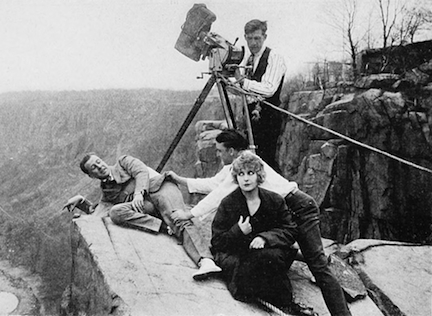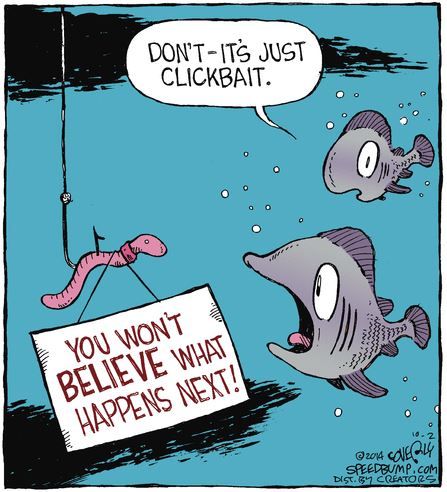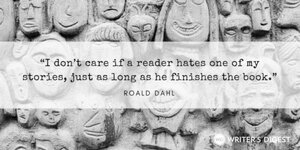Paul Whybrow
Full Member
I'm coming towards the end of writing my fifth Cornish Detective novel, casting around for ways to pull the rug out from the feet of my characters and my readers.
With any genre of writing, there has to be a form of clickbait, to use a computer term, to entice a reader to read on.
This morning, I came across an intriguing article about how to generate excitement with cliffhangers, which focuses on horror writer R.L. Stine's technique of torturing the reader, by closing a chapter at a crucial moment. Stine plainly knows what he's talking about with sales of 400 million copies of hundreds of titles.
Why over 60% of your readers will never finish your story— and 3 ways to fix it
Writing guru David Gaughran is quoted in the article, with startling statistics about how few readers will make it all of the way through to the end of your book:
“Kobo released some very interesting figures some time ago, showing that 40% was actually a good readthrough rate and 50% was generally considered to be exceptional.”
(From: Strangers To Superfans: A Marketing Guide to the Reader Journey)
Gaughran blames the ever-present distractions of reading an eBook for people's impatience and lack of perseverance. Somehow, I'm not exactly outraged by their failure to complete reading a story, at least from a commercial point of view, for surely the crucial thing is that the author made a sale by doing something right to attract a reader's attention in the first place. Also, without statistics about traditional printed book readthrough rates, the 40% figure exists in cyber isolation. Would improving on the aimed-for target of 60% help an author's name to be more memorable...or excite readers so much, that their word of mouth raving catapulted the book into the bestseller lists?
Incidentally, Gaughran's website is a useful resource for writers, and signing up for his newsletter gets you a free download of his book Amazon Decoded, should you be thinking of going the self-publishing route.
With my own reading of fiction, I get through about 225 novels a year, mostly borrowed from my local library. Halfway though 2018, I've given up on about ten, mainly because of not being able to gel with the author's style and also because the story was unrelentingly tedious. I've never read a novel in eBook format.
I previously posted about whether reading as a writer spoils the enjoyment. Certainly, I can't stop myself from noting the author's technique. About half of the novels I read are in my chosen writing genre of crime, and having read thousands and written five of them, it's unusual for me to be surprised by whodunnit!
My own Cornish Detective stories are more howcatchems, in which the reader knows who killed the victim or committed the robbery, long before my protagonist detective does, hopefully making them want to see how he tracks them down. I still lay red herrings, and in one story completely hoodwinked the reader by misdirection, only revealing there was a second murderer operating in the closing chapters.
Creating cliffhangers, at the end of a chapter or section break, can look heavy-handed and become predictable. I read one formulaic thriller, in which each and every chapter ended with a question mark...it soon got to the point where I didn't care what the answer to the question was.
One hundred years ago, there was a cinema series called The Perils of Pauline, featuring Pearl White as the title character. Each episode ended on an exciting incident, with the heroine facing what looked like an insurmountable threat. In those pre-television days, millions of folk attended movie theatres. It cost pennies to get in, and with a dozen shows daily so many bums on seats gave large profits. Audiences were hooked, and sometimes Pauline would literally be hanging off a cliff.

The tradition of cliffhanger endings in literature goes back to One Thousand And One Nights, the tales compiled in the Islamic Golden Age, from the 8th-14th centuries, and which were first translated into English at the beginning of the 18th-century. The trick is, to get the readers or listeners to care what happens to the main character next. They'll suspend their disbelief, if the air of tension crackles enough to make it look like the hero is doomed.
Charles Dickens and Thomas Hardy both published their novels in serial form, which forced them to write in a climax at the end of each episode. They were known as sensation novels. Indeed, Thomas Hardy is credited with inventing the term 'cliffhanger', as Henry Knight, the hero of A Pair of Blue Eyes, is left dangling off a Cornish cliff at the end of one episode.
(He knew what he was talking about, as from living here, I reckon twenty people a year die falling off Cornish cliffs—usually holidaymakers.)
With my own Cornish Detective novels, I sometimes use cliffhangers to close a chapter or section break. Last night, I wrote a scene where one of the detectives, who's lesbian, combative and has a black belt in karate, finally caught a break on a case, identifying the perpetrators. She was practically emitting steam as she went to arrest the twin brothers who've been stealing car park ticket machines, accompanied by a man mountain colleague. That made for a suitable section break. The next section of the chapter described a car chase and fight with the brothers, before they were arrested.
Instead of overt cliffhangers, I often close a chapter with my protagonist or antagonist thinking exactly the wrong thing about what will happen next, something the reader knows from being privy to what other characters have been up to. This may well create "Don't do that, you idiot" tension, encouraging them to read on.
I'm going to end my WIP The Dead Need Nobody on a colossal cliffhanger, with my hero copper at death's door after massive blood loss from being repeatedly stabbed. Any readers I attract will have to read the next book to see if he survives.
Do you use cliffhangers in your writing?
Do you mind sharing some of your good ones?

With any genre of writing, there has to be a form of clickbait, to use a computer term, to entice a reader to read on.
This morning, I came across an intriguing article about how to generate excitement with cliffhangers, which focuses on horror writer R.L. Stine's technique of torturing the reader, by closing a chapter at a crucial moment. Stine plainly knows what he's talking about with sales of 400 million copies of hundreds of titles.
Why over 60% of your readers will never finish your story— and 3 ways to fix it
Writing guru David Gaughran is quoted in the article, with startling statistics about how few readers will make it all of the way through to the end of your book:
“Kobo released some very interesting figures some time ago, showing that 40% was actually a good readthrough rate and 50% was generally considered to be exceptional.”
(From: Strangers To Superfans: A Marketing Guide to the Reader Journey)
Gaughran blames the ever-present distractions of reading an eBook for people's impatience and lack of perseverance. Somehow, I'm not exactly outraged by their failure to complete reading a story, at least from a commercial point of view, for surely the crucial thing is that the author made a sale by doing something right to attract a reader's attention in the first place. Also, without statistics about traditional printed book readthrough rates, the 40% figure exists in cyber isolation. Would improving on the aimed-for target of 60% help an author's name to be more memorable...or excite readers so much, that their word of mouth raving catapulted the book into the bestseller lists?
Incidentally, Gaughran's website is a useful resource for writers, and signing up for his newsletter gets you a free download of his book Amazon Decoded, should you be thinking of going the self-publishing route.
With my own reading of fiction, I get through about 225 novels a year, mostly borrowed from my local library. Halfway though 2018, I've given up on about ten, mainly because of not being able to gel with the author's style and also because the story was unrelentingly tedious. I've never read a novel in eBook format.
I previously posted about whether reading as a writer spoils the enjoyment. Certainly, I can't stop myself from noting the author's technique. About half of the novels I read are in my chosen writing genre of crime, and having read thousands and written five of them, it's unusual for me to be surprised by whodunnit!
My own Cornish Detective stories are more howcatchems, in which the reader knows who killed the victim or committed the robbery, long before my protagonist detective does, hopefully making them want to see how he tracks them down. I still lay red herrings, and in one story completely hoodwinked the reader by misdirection, only revealing there was a second murderer operating in the closing chapters.
Creating cliffhangers, at the end of a chapter or section break, can look heavy-handed and become predictable. I read one formulaic thriller, in which each and every chapter ended with a question mark...it soon got to the point where I didn't care what the answer to the question was.
One hundred years ago, there was a cinema series called The Perils of Pauline, featuring Pearl White as the title character. Each episode ended on an exciting incident, with the heroine facing what looked like an insurmountable threat. In those pre-television days, millions of folk attended movie theatres. It cost pennies to get in, and with a dozen shows daily so many bums on seats gave large profits. Audiences were hooked, and sometimes Pauline would literally be hanging off a cliff.

The tradition of cliffhanger endings in literature goes back to One Thousand And One Nights, the tales compiled in the Islamic Golden Age, from the 8th-14th centuries, and which were first translated into English at the beginning of the 18th-century. The trick is, to get the readers or listeners to care what happens to the main character next. They'll suspend their disbelief, if the air of tension crackles enough to make it look like the hero is doomed.
Charles Dickens and Thomas Hardy both published their novels in serial form, which forced them to write in a climax at the end of each episode. They were known as sensation novels. Indeed, Thomas Hardy is credited with inventing the term 'cliffhanger', as Henry Knight, the hero of A Pair of Blue Eyes, is left dangling off a Cornish cliff at the end of one episode.
(He knew what he was talking about, as from living here, I reckon twenty people a year die falling off Cornish cliffs—usually holidaymakers.)
With my own Cornish Detective novels, I sometimes use cliffhangers to close a chapter or section break. Last night, I wrote a scene where one of the detectives, who's lesbian, combative and has a black belt in karate, finally caught a break on a case, identifying the perpetrators. She was practically emitting steam as she went to arrest the twin brothers who've been stealing car park ticket machines, accompanied by a man mountain colleague. That made for a suitable section break. The next section of the chapter described a car chase and fight with the brothers, before they were arrested.
Instead of overt cliffhangers, I often close a chapter with my protagonist or antagonist thinking exactly the wrong thing about what will happen next, something the reader knows from being privy to what other characters have been up to. This may well create "Don't do that, you idiot" tension, encouraging them to read on.
I'm going to end my WIP The Dead Need Nobody on a colossal cliffhanger, with my hero copper at death's door after massive blood loss from being repeatedly stabbed. Any readers I attract will have to read the next book to see if he survives.
Do you use cliffhangers in your writing?
Do you mind sharing some of your good ones?


